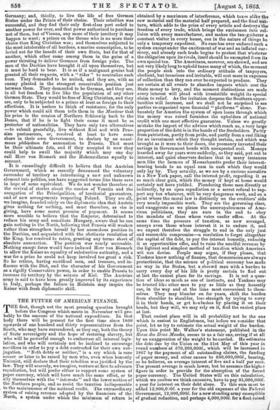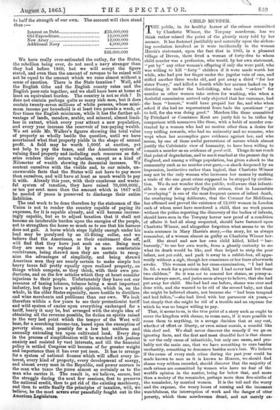THE FUTURE OF AMERICAN FINANCE.
THE first, though not the most pressing question brought before the Congress which meets in November will pro- bably be the amount of the national expenditure. In that body there will be present for the first time since 1860 upwards of one hundred and thirty representatives from the South, who may have surrendered, as they say, both the theory of State sovereignty and the hope of restoring slavery, but who will be powerful enough to embarrass all internal legis- lation, and who will certainly not be inclined to encourage sacrifices in order to pay a debt contracted for their own sub- jugation. " Both debts or neither," is a cry which is sure sooner or later to be raised by men who, even when honestly Unionist, still declare that their rebellion was justified by the law. They will scarcely, we imagine, venture at first to advocate repudiation, but will prefer either to support some system of paper currency, which will have much the same effect, or to ally themselves with the " interests " and the lower section of the Northern people, and so resist the taxation indispensable . to the maintenance of the national credit. The extraordinary system of raising revenue adopted by the financiers of the North, a system under which the minimum of return is
obtained by a maximum of interference, which taxes alike the raw material and the material half prepared, and the final out- turn, which adds to the price of every article and destroys the freedom of every trade, which brings the excisemen into col- lision with every manufacturer, and makes the tax-gatherer a constant visitor in every house, can in the nature of things be only a temporary expedient. No race has ever endured such a system except under the excitement of war and an inflated cur- rency, and already each trade begins to protest that whatever the obligation upon its rivals, itself should be exempted from its own special tax. The Americans, morever, are shrewd, and are not very likely long to uphold taxes many of which, the moment the people sink into the ordinary attitude of taxpayers, obedient, but tenacious and irritable, will cost more in expenses of collection than they can ever be expected to produce. They are certain at all events to abandon imposts which cost the State money to levy, and the moment distinctions are made every interest will plead with irresistible weight its special claim to relief. As the irritation deepens the Southern oppor- tunities will increase, and we shall not be surprised to see parties re-organized upon financial " platforms " alone. For- tunately for America the system of open loans through which the money was raised furnishes the upholders of national credit with one most effective guarantee. Unless we greatly mistake the import of the advices which reach us, a very large proportion of the debt is in the hands of the freeholders. Partly from patriotism, partly from pride, and partly from a real liking for an investment which they thought certain, and which was brought as it were to their doors, the yeomanry invested their savings in Government bonds with unexpected zeal. Moneys hoarded away for years were suddenly, as they said, put out to interest, and quiet observers declare that in many instances men like the farmers of Massachusetts prefer their interest- bearing bonds to an equal sum in cash which they would only lay by. They actually, as we see by a curious narrative in a New York paper, call the interest profit, regarding it as so much clear gain, which the money if kept at home would certainly not have yielded. Plundering those men directly or indirectly, by an open repudiation or a secret refusal to sup- port any tax whatever, will be very dangerous work, and on a point where the moral law is distinctly on the creditors' side very nearly impossible work. They are the governing class, and exaggerate as we please the unscrupulousness of Ame- rican politicians, they are sure in the end to obey the mandate of those whose votes confer office. At the same time the pressure of taxation, as now arranged, annoys even those whose interest it is to endure it, and we expect therefore the struggle to end in the only just and reasonable compromise—a resolution to forget altogether the capital of the debt, to pay the interest honestly, redueidg it as opportunities offer, and to raise the needful revenue by the lightest and simplest method of taxation which American wit can devise. People may argue, if they please, that Yankees know nothing of finance, that democracieaare always protectionist, that the science of political economy has made no way in the States, but a shrewd man with a burden to carry every day of his life is pretty certain to find out at last the easiest place for its carriage. It is not a ques- tion of ideas so much as one of instincts, and Yankees may be trusted like other men to pay as little as they honestly can, in the way and at the time most convenient to them- selves. They may blunder on for years, shift the burden from shoulder to shoulder, lose strength by trying to carry it in their hands, or get headaches by placing it on their heads, but they will, we may rely on it, find the easiest place at last.
That easiest place will in all probability not be the one which is easiest to Englishmen, but before we consider that point, let us try to estimate the actual weight of the burden. Upon this point Mr. Walker's statement, published in the Revue des Deux Mondes, seems to us a fair one, erring if at all by an exaggeration of the weight to be carried. He estimates the debt due by the Union on the 31st May of this year in round numbers at 570,200,0001., which will be increased in 1867 by the payment of all outstanding claims, the funding of paper money, and other causes to 650,000,0001., bearing, as he believes, an average interest of five and a half per cent. The present average is much lower, but he assumes the higher figure in order to provide for the absorption of the forced paper currency. The United States will on this calculation, which we confess we think excessive, have to pay 35,000,0001. a year for interest on their debt alone. To this sum must be added 12,000,0301. a year for the old expenses of the Federal Government, 12,000,000h for a new standing army susceptible of gradual reduction, and perhaps 4,000,0001. for a fleet raised to half the strength of our own. The account will then stand thus :— Interest on Debt £35,000,000 Old Expenditure 12,000,000 New Army • 12,000,000 Additional Navy 4,000,000 £63,000,000 We have really over-estimated the outlay, for the States, the rebellion being over, do not need a navy stronger than they had before 1860, but we will accept the figure stated, and even then the amount of revenue to be raised will not be equal to the amount which we raise almost without a sense of exertion. There is the State taxation ? Well, add the English tithe and the English county rates and the English poor-rate together, and we shall have here at home at least an equivalent burden. The country is not so rich ? It does not contain perhaps quite so many rich men, but it does contain twenty-seven millions of white persons, whose mini- mum income per household is at least two pounds a week, or four times the English minimum, while it has the further ad- vantage of lands, meadow, arable, and mineral, almost limit- less in extent, which every year attract a new population, and every year increase the reservoir of tax-paying wealth. We set aside Mr. Walker's figures showing the total value of property as wholly beside the question, until we have ascertained what that property yields in the shape of annual profit. A field may be worth 1,0001. at auction, yet not help to pay the taxes, and the American system of valuing fixed property and including such resources as fish- eries renders their return valueless, except as a kind of Nilometer of wealth showing its decennial increase. We content ourselves with the visible and, to our minds, un- answerable facts that the States will not have to pay more than ourselves, and will have at least as much wealth to pay it with. Already this year, with their cumbrous and waste- ful system of taxation, they have raised 70,000,0001., or ten per cent. more than the amount which in 1867 will be needed if peace is preserved to discharge their entire liabilities.
The real work to be done therefore by the statesmen of the Union is not to render the country capable of paying its expenses, for it is capable already, and will become increas- ingly capable, but so to adjust taxation that it shall not become an intolerable burden upon the energies of the people, not to strengthen the horse so much as to see that his harness does not gall. A horse which steps lightly enough under his load may be paralyzed by an ill-fitting collar, and we believe that the Americans, as their excitement dies off, will find that they have just such an one. Being men they are sure to replace it by a more comfortable contrivance, being shrewd men they are certain to recog- nize the advantages of simplicity, and being shrewd American men they are nearly certain to make simple but heavy taxes fall pretty equally upon realized property,.on things which compete, as they think, with their own pro- ductions, and on the few articles which they at heart consider injurious to their people. Unfortunately they have not our resource of taxing tobacco, tobacco being a most important industry, but they have a public opinion, which is, on the whole, in the older States especially, more hostile to distillers and wine merchants and publicans than our own. We look therefore within a few years to see their protectionist tariff and wild system of excise upon everything exchanged for a tariff, heavy it may be, but arranged with the single idea of obtaining all the revenue possible, for duties on spirits raised to the very last point which the temper of the West will bear, for a searching income-tax, based upon the exemption of poverty alone, and possibly for a low but uniform and annually extending tax upon cultivated land. Every step in the process of simplification will be watched with jealous anxiety and resisted by vast interests, and till the financial policy is settled Congress will become of far greater weight and importance than it has ever yet been. It has to arrange for a system of national finance which will affect every in- terest, every kind of property, every development of energy, and almost every man in the Republic, and power accrues to the man who taxes the purse almost as certainly as to the man who carries it. The result is, we believe, secure, but the struggle during the next few sessions, first to preserve the national credit, then to get rid of the existing machinery, and then to settle finally the principles of taxation, will, we believe, be the most severe ever peacefully fought out in the American Legislature.































 Previous page
Previous page